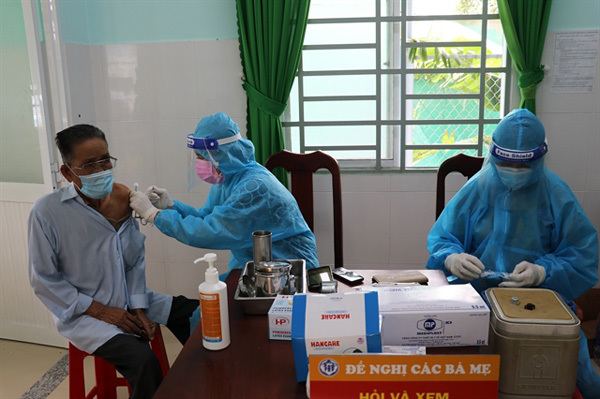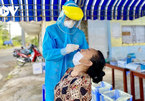 |
| Tien Giang Province is speeding up its COVID-19 vaccinations for people at a high risk of infections as part of an effort to contain the outbreak. — VNA/VNS Photo Huu Chi |
The delta’s 12 provinces and Can Tho, its largest city, are now facing a complicated outbreak situation.
More than 8,000 cases have been detected in Can Tho so far, according to the city’s Department of Health. The city recorded its highest number of daily infections with 434 new COVID-19 cases on November 1.
Of the number, 20 cases were detected through screening and rapid tests, 82 cases were found in blockaded areas, and 62 cases were in home isolation. Twelve cases had returned from COVID-19 hit localities and 270 cases were in quarantine facilities.
Nearly 2,000 new cases were detected in Kien Giang Province in the last week of October, an increase of 1,385 cases compared to the previous week.
The number of daily infections stands at an average of 280 cases. The highest number of new cases was recorded in Rach Gia City and in districts Phu Quoc, Hon Dat, Chau Thanh and Tan Hiep.
Dong Thap Province recorded 323 new cases from October 25-31. There were 89 new cases on November 1, including 46 community cases.
On November 1, there were 315 new cases found in An Giang Province, 198 in Soc Trang Province, 163 in Tien Giang, 72 in Tra Vinh Province and 13 in Ben Tre Province.
Enhancing pandemic control
The Ministry of Health on November 1 sent an urgent document to all localities in the Mekong Delta asking them to strictly implement anti-pandemic work following the instructions of the Prime Minister and National Steering Committee for COVID-19 Prevention and Control, and the Ministry of Health’s regulations and guidelines.
The localities were asked to develop a master plan focusing on vaccine coverage and improving treatment capacity of the health system.
They must strengthen surveillance and early detection of new cases to promptly isolate and prevent the spread of the virus, and strictly control border areas and roads, trails and openings.
Quarantine facilities and blockaded areas must implement prevention measures to avoid cross-infection.
Medical examination and treatment facilities must also require medical declarations, body temperature checks, and COVID-19 screening and classification of patients.
All medical facilities should have sufficient medicine and equipment for COVID-19 patients, and limit the development of serious cases by quickly treating cases.
The ministry also asked localities to set up a treatment system including intensive care centres, field hospitals, mobile medical stations and medical teams to care for COVID-19 patients treated at home.
Localities must speed up vaccinations for people aged 18 and above, and begin vaccinating children aged 12-17 following its instructions.
They were also asked to strictly control movement between different areas, and manage residents in high-risk areas and returnees from other localities.
Relaxing social distancing measures, reopening production and business activities, and restoring the economy in areas at low risk of infection were other requests.
Speaking at a meeting on Monday, the secretary of Dong Thap Province’s Party Committee, Le Quoc Phong, said the outbreak is under control but people should not be neglectful due to the unpredictable development of the pandemic.
He asked all sectors to raise awareness about pandemic prevention and control, and remind people to strictly follow the Ministry of Health's 5K message.
They must provide guidance to localities and handle violations of regulations on pandemic prevention and control.
Pham Thien Nghia, chairman of Dong Thap Province’s people’s Committee, has asked local authorities to prepare a "four on-site" plan for pandemic prevention and control.
More testing should be done in high-risk areas to detect early cases, and localities should manage gatherings of large crowds and help businesses resume operations.
Lam Minh Thanh, chairman of Kien Giang Province’s People’s Committee, said that Phu Quoc Island was preparing to implement a pilot programne on welcoming back international and domestic tourists. However, the number of community cases is on the rise in the island, posing a high risk of new outbreaks.
“It is difficult to carry out the pilot programme if there is no better solution,” he said.
The number of new infections in quarantine facilities and blockade areas is still high, an increase of over 1,100 new cases.
Quarantine is not strictly carried out according to instructions, and cross-contamination is still occurring.
Thanh told localities to stop taking new cases to concentrated quarantine facilities, implement home quarantine, and set up concentrated quarantine facilities for COVID-19 patient treatment.
Localities with a high number of new cases must deploy COVID-19 testing and screening to identify and isolate positive cases as quickly as possible, trace the source of the infections and break the chain of infections.
He said that periodic testing should be conducted in high-risk areas, and that COVID-19 vaccinations should be sped up, especially for the elderly and those with underlying medical conditions.
Localities must focus on three pillars: quarantine on the narrowest possible scale with the strictest and fastest measures; goals and roadmaps for appropriate and effective solutions; and ending the time for quarantine and areas under lockdown as soon as possible.
Source: Vietnam News

Mekong Delta localities raise COVID-19 alert level as cases surge
The Mekong Delta provinces are scrambling to control an unexpected surge in community cases of COVID-19, with many showing unknown sources of infection.